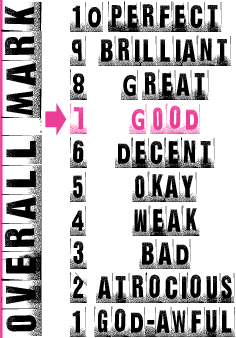
Director: Glenn Gaylord
Running Time: 87 mins
Certificate: 15
Release Date: October 28th 2013

Often when a film decides it wants to take on an ‘issue’, it’s painful to watch. The story get twisted and hammered in order to serve the exploration of the problem, so that it feels more like a heavy-handed lecture than a movie. I Do however manages bring in all sorts of points and ideas about how lack of LGBT equality in the US has effected bi-national couples, and yet makes it feel organic and simply as if it’s telling the truth about the characters. That’s perhaps even more impressive as it’s the first feature script of David W. Ross, who also plays the lead role (and is, incidentally, a former member of 90s British boyband, Bad Boys Inc.).
The movie follows Jack (Ross), a Brit living in the US. After his brother dies, Jack remains close to his American sister-in-law (Alicia Witt) and niece. Indeed his entire life is in the US. However he discovers his visa won’t be renewed and that the law says he’s going to have to leave the country. Despite being gay, he asks his friend Ali (Jamie-Lynn Sigler) if she will marry him, purely to get a green card. She agrees, but as the impact of what she’s about to do – not least the threat of jail if it’s discovered it’s a fake marriage – she starts to get cold feet.
Despite Jack generally avoiding dating relationships that go beyond the casual, he begins to get closer to the man who could be the love of his love. He’s Spanish and if they go to Europe they could have the equality that eludes Jack in the US – as their relationship has no legal standing federally in America, even if marriage is legal in the state they’re in – but that would involve leaving the life he’s built for himself behind, even if it’s in a country that wants to deport him.
I Do is a careful, well-written movie that always ensures its themes come from the characters rather than hitting you over the head with them. It’s careful not to sound like its preaching and also ensures Jack isn’t purely a martyr hung on the cross of inequality. He’s in an unfair situation but he’s flawed and makes some bad decisions. I Do does well to create situations where Jack is stuck between a rock and a hard place, largely due to the film exploring the idea that many gay people have to look for love, friends and family in different places and the needs of these will inevitably clash. That is, Jack has a family with his sister-in-law and niece, but he can only find romantic love with a man.
It’s a well-written, pretty well acted movie that takes on big issues while ensuring they come from the involving story, rather than the other way around. It could perhaps have done with a lighter tone at times, as there are moments when it feels like a rom-com that’s forgotten about the comedy, but it still works as a drama, helped by the fact it has a tough edge. It’s also keen to be a film that’s gay-themed but not a gay film, and it succeeds at that, being a movie that’s about people, irrespective of their sexual orientation.
Since the film was made, things have begun to change for bi-national same-sex couples in the US. The Supreme Court decision striking down parts of DOMA (Defence Of Marriage Act) has resulted in the immigration services beginning to treat gay couple more like they would straight couples. There’s still a long way to go – after all, you need to be married for your partner to get a green card, and not all States allow marriage for same sex couples – but the first people have been allowed to stay in the US based on their marriage to a person of the same sex. Hopefully some of the issues in I Do will therefore soon be a thing in of the past.
Overall Verdict: A well written film that explores issues surrounding LGBT equality but ensures that it’s not just about the issues, it’s about people trying to find their way through the unfair hand that’s been dealt to them, and it does them in an interesting way.
Reviewer: Tim Isaac





Leave a Reply (if comment does not appear immediately, it may have been held for moderation)